
Delivery & Installation
-

Use code DBD and get 10% on entire delivery ONLY orders (1-3 Days)* Discount not Good with Installed orders Minimum order $150
-
$250.00 + FREE delivery & Installation
All orders of $250.00 and more qualify you for FREE delivery & Installation (Hillsborough, Pinellas, Manatee and Pasco Counties ONLY)
Plant It Tampa Bay
Perennial Peanut
Couldn't load pickup availability
Perennial Peanut
The Perennial Peanut plant, scientifically known as Arachis pintoi, is a versatile and low-maintenance ground cover that offers both aesthetic and practical benefits in landscaping. This evergreen perennial features small, bright yellow flowers and dense foliage, creating a lush carpet-like effect in gardens and landscapes. Here are five key points about the Perennial Peanut plant:
- Drought Tolerant: Thrives in dry conditions and requires minimal watering once established.
- Erosion Control: Helps prevent soil erosion with its dense root system and ground-covering growth habit.
- Pollinator Attraction: Attracts bees and butterflies with its vibrant yellow flowers, supporting local pollinator populations.
- Low Maintenance: Requires little to no mowing or pruning, making it a hassle-free landscaping option.
- Ground Cover: Ideal for filling in bare spots, suppressing weeds, and creating a green carpet effect in both residential and commercial landscapes.
With its attractive appearance, ecological benefits, and ease of care, the Perennial Peanut plant is a valuable addition to any landscape seeking a sustainable and visually appealing ground cover solution.
 |
Advantages:Easy To Grow Low Maintenance Drought tolerant Good For Containers |
 |
Grow Best:
Containers |
 |
Ideal position:Full to Part sun 3 to 6 hours morning sun best |
 |
Water:Water regularly - weekly, or more often in extreme heat or containers. |
 |
Healthy Temperatures:Warm, tropical vibes of 65-90°F Grown indoors as a houseplant but can be grown outdoors in USDA Hardiness Zones 5-11 |
|
|
Growth Outlook:Height : 1' - 2' Wide: Up To 4" Growth Rate: Fast Plant Spacing: 3' to 4' apart *Will grow in part shade/part sun, but full sun will bring more blossoms. |
 |
Pet Friendly - Yes
|
 |
Qualifies For Free Delivery |
Best Applications
Applications
The Perennial Peanut plant, also known as Arachis pintoi, is a versatile and attractive ground cover that offers numerous benefits in landscaping. Here are some of the best uses for the Perennial Peanut plant:
Erosion Control: The dense mat-like growth of Perennial Peanut helps prevent soil erosion on slopes and embankments, making it an excellent choice for stabilizing and protecting the landscape.
Groundcover: Perennial Peanut forms a lush carpet of green foliage that can be used to cover large areas of the garden, creating a uniform and visually appealing look.
Pollinator Attraction: The bright yellow flowers of Perennial Peanut attract pollinators such as bees and butterflies, making it a valuable addition to pollinator-friendly gardens.
Low-Maintenance Lawns: Perennial Peanut requires minimal maintenance, making it a great alternative to traditional turf grass lawns. It does not need frequent mowing and is drought-tolerant once established.
Underplanting: Perennial Peanut can be used as an underplanting beneath trees and shrubs, providing a living mulch that helps retain soil moisture and suppress weeds.
Overall, the Perennial Peanut plant is a versatile and sustainable landscaping option that can be used in a variety of ways to enhance the beauty and functionality of outdoor spaces.

Caring For
 |
 |
 |
 |
| Ideal position | Water | Temperatures | Food |
Caring for Perennial Peanut
Caring for Perennial Peanut (Arachis pintoi) involves providing the right conditions to ensure its health and growth. Here are some essential care tips for Perennial Peanut plants
Caring for Perennial Peanut (Arachis pintoi) involves providing the right conditions to ensure its health and growth. Here are some essential care tips for Perennial Peanut plants:
Sunlight: Perennial Peanut thrives in full sun to partial shade. Plant it in a location where it receives at least 6-8 hours of sunlight daily for optimal growth.
Well-Draining Soil: Ensure that the soil is well-draining to prevent waterlogging, which can lead to root rot. Perennial Peanut prefers sandy or loamy soil with good drainage.
Watering: Water Perennial Peanut regularly, especially during the establishment period. Once established, it is drought-tolerant and requires minimal watering. Avoid overwatering to prevent root rot.
Fertilization: Perennial Peanut is a low-maintenance plant that does not require frequent fertilization. A light application of a balanced fertilizer in spring can help promote healthy growth.
Pruning: Trim Perennial Peanut plants as needed to maintain a tidy appearance and encourage new growth. Remove any dead or damaged foliage to promote overall plant health.
By providing adequate sunlight, well-draining soil, appropriate watering, minimal fertilization, and occasional pruning, you can help your Perennial Peanut plants thrive and create a beautiful ground cover in your landscape.
Share
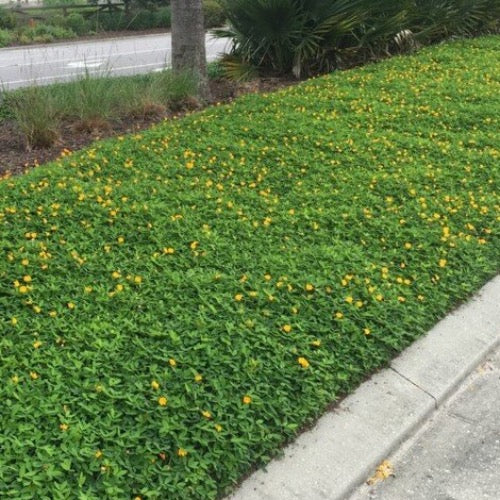
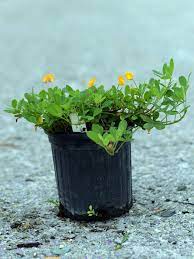
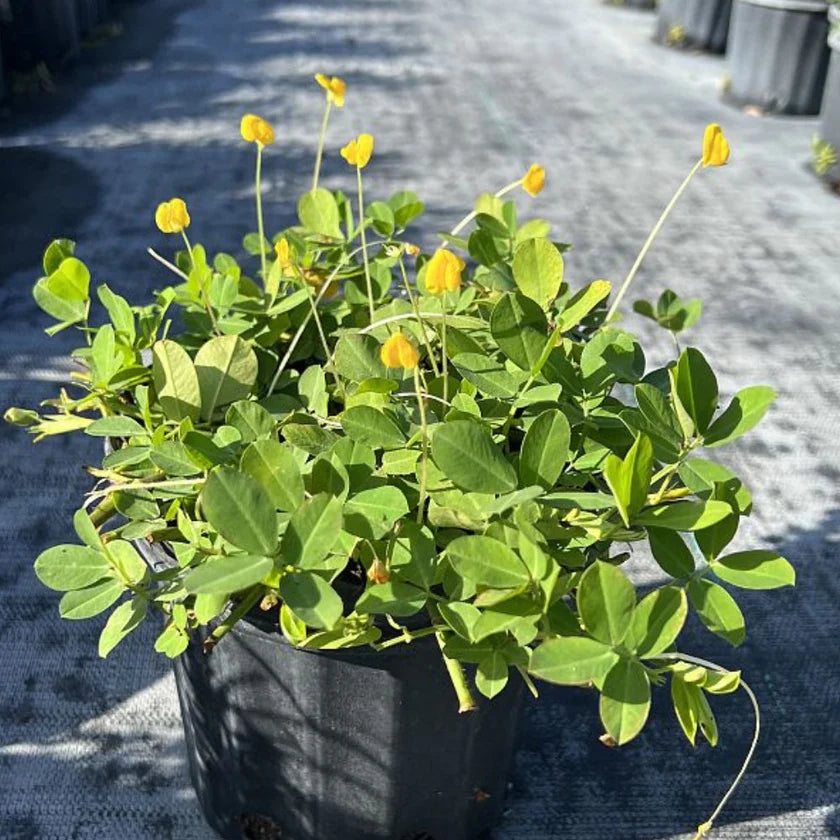




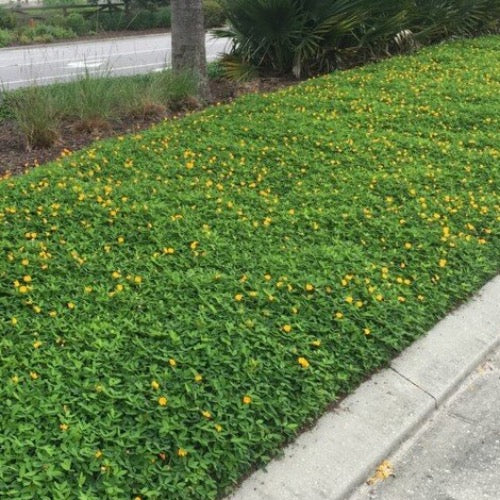
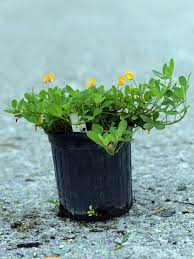
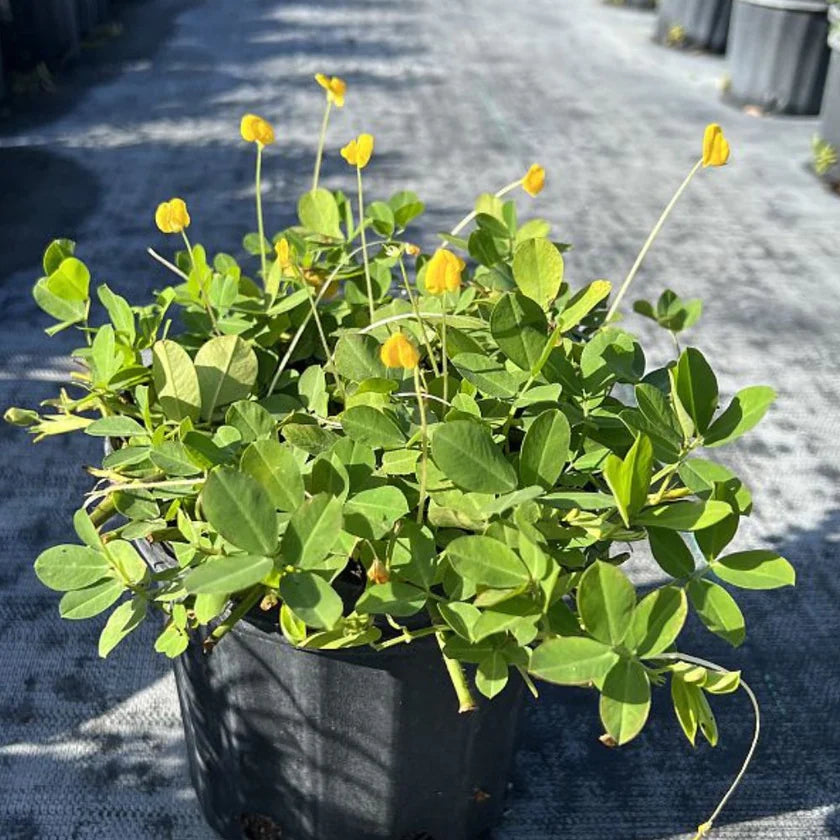
 Landscape
Landscape Indoors
Indoors
